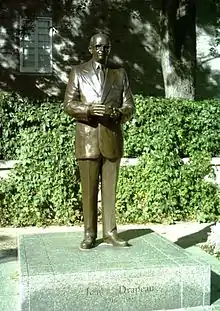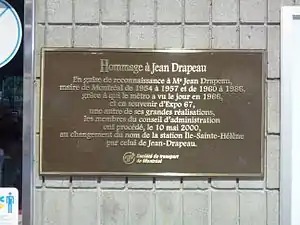Jean Drapeau
Jean Drapeau, CC GOQ (18 February 1916 – 12 August 1999) was a Canadian lawyer and politician who served as mayor of Montreal from 1954 to 1957 and 1960 to 1986. Major accomplishments of the Drapeau Administration include the development of the Montreal Metro mass transit system, the successful revival of international expositions such as with Expo 67 as well as the construction of a major performing arts centre, the Place des Arts. Drapeau also successfully lobbied for the 1976 Summer Olympics and personally chose its lead architect, Roger Taillibert, to design the city's iconic stadium, athlete's village and inclined tower. Drapeau was also primarily responsible for leading the city's effort to secure a Major League Baseball franchise, with the creation of the Montreal Expos in 1969. Under Drapeau, Montreal solidified its position as Canada's premier urban area, and various projects initiated under his administration foretokened a continental status for the city. This ambition was present until the economic decline of Montreal.
Mayor Jean Drapeau | |
|---|---|
 Jean Drapeau in 1954 | |
| 37th Mayor of Montreal | |
| In office 1954–1957 | |
| Preceded by | Camillien Houde |
| Succeeded by | Sarto Fournier |
| In office 1960–1986 | |
| Preceded by | Sarto Fournier |
| Succeeded by | Jean Doré |
| Personal details | |
| Born | 18 February 1916 Montreal, Quebec, Canada |
| Died | 12 August 1999 (aged 83) Montreal, Quebec, Canada |
| Political party | Civic Party of Montreal |
| Spouse(s) | Marie-Claire Boucher |
| Alma mater | Université de Montréal |
| Profession | Lawyer |
| Signature | |
Although he is remembered as a visionary, Drapeau's mishandling of the construction of the Olympic Games facilities resulted in massive cost overruns and left the city with a debt of over $1 billion that took its citizens over thirty years to fully pay off.
Early life and career
The son of Joseph-Napoléon Drapeau and Alberta (Berthe) Martineau, Jean Drapeau was born in Montreal in 1916. His father, an insurance broker, city councilor and election worker for the Union nationale, introduced him to politics. Jean Drapeau studied law at the Université de Montréal.
Drapeau was a protégé of nationalist priest Lionel Groulx in the 1930s and 1940s,[1] and was a member of André Laurendeau's anti-conscription Ligue pour la défense du Canada. In 1942, he ran as a candidate of the nationalist Bloc Populaire, which opposed Canadian conscription during World War II, in a federal by-election (see Second Conscription Crisis). Drapeau lost the election. He was also a Bloc populaire candidate in the 1944 provincial election but was badly defeated in his Montreal constituency.[1]
He began his practice as a criminal lawyer in Montreal in 1944. During the Asbestos Strike of 1949, he took on the legal defence of some of the strikers.[1]
In 1945, he married Marie-Claire Boucher. They had three sons.
Mayor of Montreal

Jean Drapeau's profile grew as the result of his role in a public inquiry led by Pacifique Plante into police corruption in the early 1950s. When Camillien Houde retired as mayor of Montreal, Drapeau was well poised to succeed him.[1]
Drapeau was elected mayor of Montreal in 1954 at the age of 37, as the candidate of the Civic Action League, on a platform of cleaning up the administration. He ran an exceptionally wide-flung campaign, uniting a large coalition of voters from English-speaking and French-speaking parts of Montreal. Drapeau's charismatic demeanor, accessible style, and his near-fluency in both English and French (unprecedented for a mayoral candidate) propelled him to such popularity. In 1957, he lost to Sarto Fournier who was backed by the powerful Premier of Quebec Maurice Duplessis,[1] but Drapeau was elected again in the election of 1960 at the helm of his newly-formed Civic Party (Parti Civique). He was re-elected without interruption until he retired from political life in 1986. By the end of the decade, Montreal was a virtual one-party state, with Drapeau and his party only facing nominal opposition in City Hall.
During Jean Drapeau's tenure as mayor, he initiated the initial construction of the Montreal Metro subway system, Place des Arts, and Expo 67, the Universal Exposition of 1967.[1] To support the expenditures, Drapeau created the first public lottery in Canada in 1968, which he called simply a "voluntary tax", an idea that would later gain favour and become enlarged by the provincial government by creating Loto-Québec corporation in 1970.
In 1967, he received an honorary doctorate from Sir George Williams University.[2] In 1968, he received the Loyola Medal from Loyola College, which later merged with Sir George Williams to found Concordia University.[3]
In the municipal elections of October 1970, Drapeau used the proclamation of the War Measures Act and the October Crisis to discredit and neutralize the candidates of the opposition party by accusing them of being terrorist sympathisers and supporters of the Front de libération du Québec. Some opposition candidates, including his main opponent, were imprisoned only to be released after the end of the election in which Drapeau's party won all 52 seats.[1]
The 1970s saw the preparation of the 1976 Summer Olympics. Cost overruns and scandals forced the Quebec government to take over the project eight months before the Games opened.[4] Almost a year after the Games had ended, Quebec Premier René Lévesque appointed a commission to investigate the high cost overruns of the games, led by Quebec supreme court judge Albert Malouf. The inquiry found that Drapeau lacked the competence to organize the Games. Moreover, the Malouf commission found that in conjunction with the serious mistakes that were made, the price tag for the games soared due to a culture of kickbacks.[4] The Summer Games were also marked by Drapeau's controversial decision to dismantle the Corridart public art display just before the Games.[5]
Even before the Games debacle, public criticism of Drapeau's municipal administration was already growing. By 1974, a new opposition party had formed in the Montreal Citizens' Movement, which gradually grew in popularity over the next decade. In 1982, Drapeau faced his stiffest competition in decades in the person of MCM leader Jean Doré, who held Drapeau to only 48 percent of the vote. Drapeau retired ahead of the 1986 elections. Due to his long tenure, the Civic Party had become Drapeau's personal fief, and he had no clear successor. At the 1986 elections, the Civic Party was heavily defeated by the MCM; it would collapse altogether only eight years later.
Canadian Prime Minister Brian Mulroney appointed Drapeau to the position of Canadian ambassador to UNESCO in Paris.[1]
Despite the nationalism of his youth, Drapeau remained neutral during the 1980 Quebec referendum.[1]
In 1967, Drapeau was made a Companion of the Order of Canada and received the Royal Architectural Institute of Canada's Gold Medal.[6] He was named a Grand Officer of the National Order of Quebec in 1987.
After his death in 1999 (at age 83), Drapeau was interred in the Cimetière Notre-Dame-des-Neiges in Montreal.
One of the biggest parks in Montreal, Parc Jean-Drapeau, composed of Île Notre-Dame and Ile Sainte-Hélène in the middle of the Saint Lawrence river, site of the universal exposition of 1967, was renamed in his honour, as was the Metro station serving the park.
Quotations
Drapeau said "The Olympics can no more lose money than a man can have a baby."[7] after announcing the budget for the Montreal Olympic games. Following the Olympics, the city was left with a debt of $1 billion. Aislin published a famous political cartoon depicting a pregnant Drapeau on the phone, saying "'Ello, Morgentaler?", referring to a prominent Montreal then later Ontarian physician who performed abortions.
As rival Toronto grew in size and prestige, Drapeau declared: "Let Toronto become Milan. Montreal will always be Rome." This quote was later lampooned in folk wisdom, with one running joke quipping: "Montreal will always be Rome... right after the sacking."
One opponent called him "a combination of Walt Disney and Al Capone."
His critics described most of his projects as circuses. Drapeau replied: "What the masses want are monuments."
References
- " Jean Drapeau" in the Canadian Encyclopedia online
- "Honorary Degree Citation - Jean Drapeau* | Concordia University Archives". archives.concordia.ca. Retrieved 29 March 2016.
- "Jean Drapeau". www.concordia.ca. Retrieved 17 August 2017.
- "The Montreal Gazette - Google News Archive Search".
- https://web.archive.org/web/20061029095755/http://archives3.concordia.ca/Privatefonds/P119.html. Archived from the original on 29 October 2006. Retrieved 15 November 2006. Missing or empty
|title=(help) - "RAIC Gold Medal". Royal Architectural Institute of Canada. Archived from the original on 16 June 2009. Retrieved 11 December 2009.
- "The Montreal Olympics: The Summer Games of '76". CBC Digital Archives. Canadian Broadcasting Company. Retrieved 26 January 2011.
External links
| Wikiquote has quotations related to: Jean Drapeau |
- Canadian Encyclopedia entry on Jean Drapeau
- CBC Archives Drapeau's vision of bringing the Eiffel Tower to Montreal for Expo 67.
- Jean Drapeau Collection McGill University Library & Archives.

